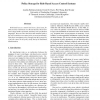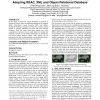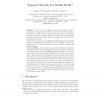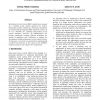WETICE
2003
IEEE
15 years 7 months ago
2003
IEEE
Role-based access control has been a focal area for many security researchers over the last decade. There have been a large number of models, and many rich specification language...
WISA
2004
Springer
15 years 7 months ago
2004
Springer
In distributed component environment, a Role-Based Access Control (RBAC) server manages all authorization policies of components in the same domains whereas the components are dist...
140
Voted
ICDCIT
2004
Springer
15 years 7 months ago
2004
Springer
We discuss research issues and models for vulnerabilities and threats in distributed computing systems. We present four diverse approaches to reducing system vulnerabilities and th...
105
click to vote
MM
2004
ACM
2004
ACM
SMARXO: towards secured multimedia applications by adopting RBAC, XML and object-relational database
15 years 7 months ago
In this paper, a framework named SMARXO is proposed to address the security issues in multimedia applications by adopting RBAC (Role-Based Access Control), XML, and ObjectRelation...
111
Voted
TGC
2005
Springer
15 years 8 months ago
2005
Springer
Our society is increasingly moving towards richer forms of information exchange where mobility of processes and devices plays a prominent role. This tendency has prompted the acade...
113
Voted
BIRTHDAY
2005
Springer
15 years 8 months ago
2005
Springer
This paper proposes a Compiled Labelled Deductive System, called ACCLDS, for reasoning about role-based access control in distributed systems, which builds upon Massacci’s tablea...
133
Voted
ATAL
2005
Springer
15 years 8 months ago
2005
Springer
We present an organisation infrastructure for open MultiAgent Systems built upon a role-based access control model (RBAC), which provides agents with means to enable and control a...
119
Voted
IRI
2005
IEEE
15 years 8 months ago
2005
IEEE
Role-Based Access Control (RBAC) models have emerged as a leading access control approach for today’s information systems. Hybrid role hierarchies introduced in the Generalized ...
123
Voted
SACMAT
2006
ACM
15 years 8 months ago
2006
ACM
Delegation of authority is an important process that needs to be captured by any access control model. In role-based access control models, delegation of authority involves delega...
111
click to vote
SACMAT
2006
ACM
15 years 8 months ago
2006
ACM
Separation of Duty (SoD) is widely recognized to be a fundamental principle in computer security. A Static SoD (SSoD) policy states that in order to have all permissions necessary...




